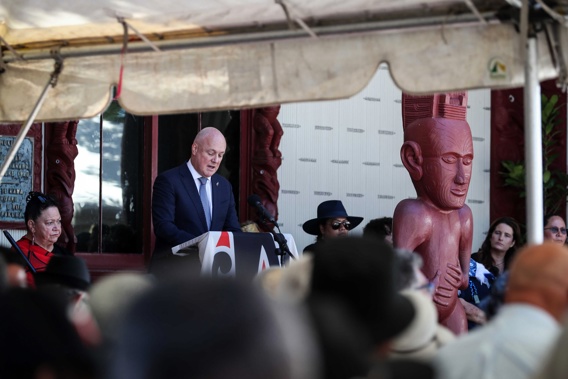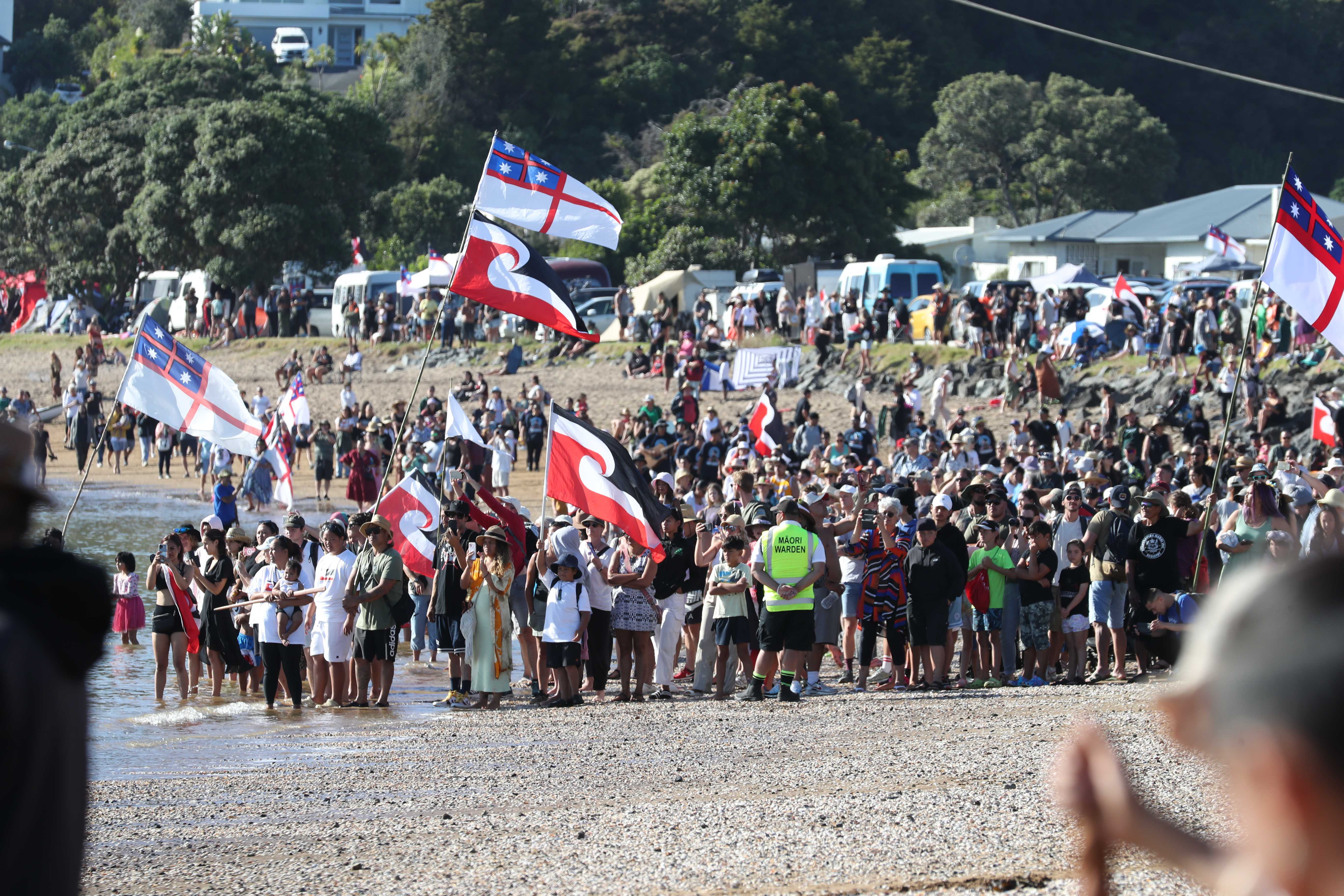
Just imagine if Prime-Minister Christopher Luxon had been escorted onto the Waitangi Treaty Ground by an armed company of infantry. Not in their crisp dress uniforms, mind, but in full battle-dress and carrying their Mars-L assault rifles with bayonets fixed. Imagine the howls of outrage from Māori and Pakeha alike.
“What message was the Government trying to send to the thousands of New Zealanders gathered at Waitangi?”, the news media would have thundered. “That the Crown, which attacked the Kingitanga in 1863 had returned? That once again Te Tiriti o Waitangi was in danger of being reduced to ‘a simple nullity’?”
The outrage occasioned by such a naked display of state power on New Zealand’s National Day would be understandable. (Although, to be fair, the involvement of the military – the Royal New Zealand Navy in particular – remains an important feature of Treaty commemorations. (On Tuesday the naval ratings performed a haka.) The participation of the armed forces is, however, entirely ceremonial. These days the Prime Minister’s protectors wear mufti.
But, if it is entirely inappropriate for the Crown to demonstrate its raw military power, is it not also just a little bit inappropriate for the organisers of the Treaty celebrations to orchestrate challenge after challenge, each one fiercer than the last, and performed within metres of the Prime Minister, the Deputy Prime Minister, and the leader of the Act Party?
Yes, the haka and the wero are part and parcel of Māori cultural practice – their original purpose being to demonstrate the community’s ability to defend itself, and determine whether those approaching were friend of foe. But Waitangi is not a fortified village, and there’s no disputing the fact that Luxon, Peters and Seymour were there by their hosts’ invitation and posed no physical threat to anyone present. So why was the ceremonial, symbolic “welcome” permitted to become an exercise in outright intimidation?
No doubt the Māori King, the Ratana Church and the organisers of Tuesday’s celebrations at Waitangi would respond with the observation that the coalition Government is widely perceived by tangata whenua as posing an all-too-real political threat to te iwi Māori, te reo, and Te Tiriti o Waitangi.

It explains why the challenges to each of the coalition’s party leaders were more than merely ceremonial. They constituted a very real challenge: were Luxon, Peters and Seymour coming before the Māori people as friends – or foes?
This division of the nation into “friends” and “foes” is the flip side to all the self-congratulatory talk about Kotahitanga. That Tainui are welcoming Ngapuhi and Ngāti Porou is, indeed, a cause for consternation. (There were Ngapuhi warriors alongside General Cameron’s troops in 1863 when Waikato was invaded.) But, this newfound unity among te iwi Māori has been achieved at a price.
Historically, alliances tend to be forged in the face of enemies – and the enemy uniting the Māori tribes is the coalition Government. Or, to put it another way, te iwi Māori (comprising less than 20 per cent of the New Zealand population) have set themselves against the coalition of National, Act and NZ First which, between them, claimed 52.78 per cent of the party vote in last year’s general election. The coalition’s opponents, Labour, Greens and Te Pāti Māori, between them accounted for just 41.59 per cent of the party Vote.
But, being in the minority only matters if you accept the majoritarian principle that underpins the democratic political system. If one does not, then even a very small minority, let alone one encompassing close to a fifth of the population, can make life impossible for a government.
Political scientists swear that any organised political force able to enrol just 3 per cent of the population consistently in acts of protest and civil disobedience, is highly likely to achieve most, if not all, of its objectives.
Three per cent of the New Zealand population is 150,000 citizens. For the record: Te Pāti Māori received 87,844 party votes in 2023. Small wonder, then, that Hone Sadler (Ngapuhi, Ngati Moerewa) demanded to know of Labour, the Greens and Te Pāti Māori, after they had been welcomed onto the Waitangi Treaty Grounds, how they planned to “fight against government policies affecting Māori”.
Roughly 1.2 million citizens party-voted Labour, the Greens and Te Pāti Māori last year. If just 13 per cent of those citizens could be consistently mobilised for “the fight”, then Seymour’s Treaty Principles Bill (and all other “anti-Māori” measures) would be seriously imperilled.
For the Opposition parties, the electoral consequences of joining “the fight”, anywhere other than the floor of the House of Representatives, could be serious. Under the Westminster System, to which New Zealand adheres, opposition parties are described as “His Majesty’s loyal opposition”. That is to say, the preferences of the electorate having been made known in free and fair elections, the parties commanding a majority of the parliamentary seats must be allowed to govern.
Constitutionally speaking, it is quite unacceptable for Opposition Members of Parliament to join in any “fight” to overturn the platform upon which the Government has been elected. Having secured majority voter support, the governing coalition is deemed to have a mandate to implement its policies. If the verdict of the electors is to be accepted only when it makes your side the winner, then democracy cannot endure.
To be an opposition party is to challenge those Government policies of which it disapproves by asking questions of ministers, testing Government bills in select committees and, ultimately, voting against them at the conclusion of their third reading debates. If they all do that well, then the opposition parties will increasingly come to resemble a government-in-waiting.
Parliamentarians can only legitimately win “the fight” against bad policies by taking a majority of the parliamentary seats in a general election.
The ease with which Te Pāti Māori and its supporters dismiss all this as “the tyranny of the majority” and call upon their compatriots to join Sadler’s “fight against the Government” is deeply troubling. Certainly, it suggests that “the tyranny of the minority” is much more to their liking.
That this politically outrageous argument comes draped in the cloak of “tino rangatiratanga” and invested with all the mana of Te Tiriti o Waitangi, suggests only that the Prime Minister may need the Crown’s enforcers a great deal sooner than he might wish.
Take your Radio, Podcasts and Music with you









